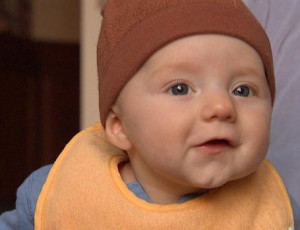Not a typo.
The most prevalent question in classes today was, “Did you see the piece on 60 minutes last night about infants and morality?”
This past Sunday, a segment on 60 Minutes featured a wife-husband team at Yale University whose experiments with infants provide compelling evidence that babies know the difference between right and wrong. The methodology they employ is showing scenarios of puppets acting in nice (helpful) and mean (unhelpful) ways toward other puppets. Babies as young as 6 months seem to strongly prefer punishing bad behavior. That would mean they can make judgments about nice and mean behavior—what Professor Paul Bloom calls “alarming sophistication” for a creature that has been seen as a blank slate or in whom moral development is at most in its “infancy.”
Bloom and his wife, Karen Wynn, who heads the research on infants, are convinced that babies are born with an innate sense of justice and that we are all born with an innate universal moral core.
So if babies “get it” is meanness and prejudice purely learned? These researchers have opinions about this question by extending their initial research to examine how babies respond to puppet characters who are like or unlike them—not in the way they look, rather in the preferences the puppets have in common with the babies. The research supports that humans also have innate biases to favor the self—we like those who like what we like and dislike the other who does not like what we like. Babies choose to prefer punishing those who do not “like what they like.”
Moral judgments and prejudice, they conclude, are both hardwired into the circuitry of our brains. It would appear that these researchers further conclude that prejudice (they called them baby bigots) trumps moral judgment—at least in infants around 6 months of age.
This finding should not surprise us as we look at photos of babies bloodied in the latest war between Israelis and Palestinians. When I look at these photos I cannot discern, “Is that a Jewish or an Islamic baby?”
If prejudice is indeed in-born we have an even more formidable task ahead of us—to teach our children from early on—very early on–to like others that don’t “like what we like.” But first, we must learn that for ourselves. Our ally. The innate soul. Liking things is a later development.










2 Comments
Judy · November 21, 2012 at 1:19 pm
Well said!
Yes, a very interesting and surprising program.
Mimsi Milton · November 21, 2012 at 6:33 pm
If you haven’t already seen the movie “I Am,” you will be thrilled with its findings about innate morality. It’s on Netflix.